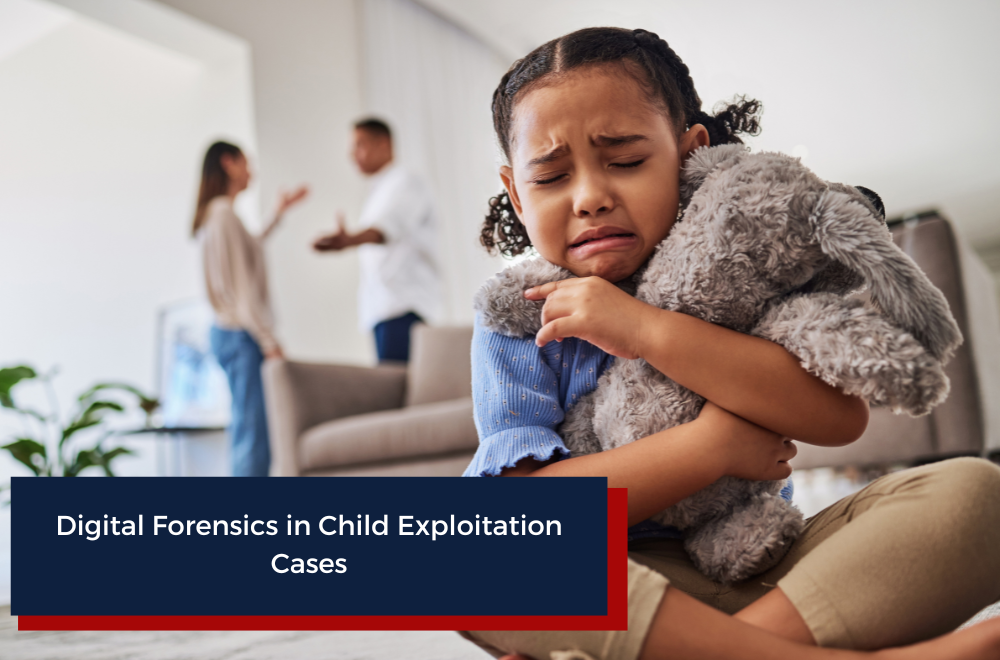
In the digital era, most child exploitation cases in New Jersey involve alleged offenders viewing or distributing illegal materials through the internet. In turn, law enforcement officials have increasingly relied on digital forensics to find these materials and track who viewed and created them. Anyone accused of possession of child exploitation material or child sexual exploitation in New Jersey must understand the importance of digital forensics if they want to avoid the most severe potential consequences of an arrest.
Role of Digital Forensics
While New Jersey’s child exploitation law covers a broad range of offenses, the main thing to know is that it’s illegal to knowingly view, possess, or have under control any materials depicting the sexual exploitation of children. Possessing or viewing this material is a third-degree crime. However, the level of crime and penalties depend on such factors as the volume of materials the offender has in their possession.
Furthermore, additional penalties apply to those who knowingly distribute child pornography, possess such material for distribution, or place the material on a file-sharing network. Even if no one else accesses the material on the network, simply uploading it to the network for distribution is a crime.
This brings us back to digital forensics. The role of digital forensics in these cases is threefold:
- To Determine if the Material in Question Depicts the Exploitation of a Child – This task is complicated by the fact that many law enforcement agencies do not have their agents directly view allegedly exploitative materials. For one thing, seeing material involving child sexual assault can cause significant trauma for the viewer. Additionally, many child safety advocates argue that every time someone sees such material represents an additional trauma for the victim, no matter the viewer’s intentions. Digital forensics can help investigators determine if photos or videos depict child exploitation without causing further harm.
- To Determine Who Created the Materials – Digital photos and video files often contain metadata showing the time, date, location, and other information related to the file’s creation. Prosecutors can use this evidence to build their case, assuming the information is reliable.
- To Determine Who Viewed or Shared the Materials – Investigators can use metadata and other digital information to track the flow of exploitative materials across the internet. Following the flow of exploitative materials allows law enforcement to track and arrest the networks responsible for creating and distributing these photos and videos.
Challenges with Digital Evidence
Child exploitation cases in New Jersey involve numerous legal hurdles, especially when handling digital evidence. This pivotal evidence presents unique challenges that can significantly affect the outcome of cases involving children who were sexually abused.
One of the foremost challenges is maintaining the chain of custody of digital evidence in child abuse cases. It’s essential to meticulously track who has accessed and handled the evidence from the moment it’s collected until it’s presented in court. Any lapse in this process can create issues regarding the evidence’s integrity.
Another significant hurdle is proving who exactly created, possessed, or distributed child sexual abuse material. With multiple users often accessing the same devices or networks, pinpointing responsibility can be complex.
Furthermore, the technical nature of digital evidence requires specialized knowledge to understand and interpret the data accurately. These challenges underscore the importance of having skilled legal support to navigate the intricacies of digital evidence in child exploitation cases.
Defense Strategies in New Jersey Child Exploitation Cases
A robust defense strategy is crucial in New Jersey child exploitation cases. The stakes are high, and the right approach can significantly affect a case’s outcome. A child exploitation lawyer might focus on several key strategies to defend our clients against these charges.
Challenging the credibility of the digital evidence is a primary strategy. This involves scrutinizing the methods used to collect, store, and analyze the evidence, ensuring they meet legal standards. If we find any procedural errors, such as breaches in the chain of custody, it could lead to the exclusion of evidence.
Another vital defense strategy is proving the lack of intent. In many child exploitation cases, demonstrating that the accused did not intentionally download or distribute exploitative materials can be a turning point. This could involve situations where materials were downloaded unknowingly or due to malware.
We also explore the possibility of constitutional violations, such as unlawful search and seizure. If law enforcement conducted searches without a proper warrant or exceeded the scope of a valid warrant, the evidence obtained might be deemed inadmissible, weakening the prosecution’s case.
Each case is unique, and an attorney will tailor their defense strategies to the specifics of the case. By leveraging their understanding of the legal system, they can advocate for the best possible outcome on the client’s behalf.
Next Steps if You Face Child Exploitation Accusations
If you are accused of child exploitation in New Jersey, you must take immediate and careful steps to protect your rights. Here’s what to do next:
- Exercise Your Right to Remain Silent – Police and prosecutors can use anything you say against you in court. Politely decline to discuss your case with law enforcement without your lawyer present.
- Contact an Experienced Criminal Defense Attorney – As soon as possible, reach out to a lawyer with experience handling child exploitation cases. An experienced lawyer will guide you through the legal process, help protect your rights, and work toward the best possible outcome.
- Follow Their Legal Advice – Your lawyer will provide specific instructions based on the details of your case. It’s crucial to follow their advice closely, including on communication, behavior, and legal strategies.
- Preserve Evidence – If you have any evidence that could potentially prove your innocence or mitigate your situation, inform your lawyer. Do not attempt to collect or handle evidence on your own.
Taking these steps can help safeguard your rights and contribute to a more favorable legal process. Remember, securing capable legal representation is essential in these cases, given the penalties for child abuse charges.
Contact a New Jersey Child Exploitation Defense Lawyer Now
A conviction on child exploitation charges in New Jersey can have devastating effects on your life and reputation. Working with a knowledgeable lawyer is the best step you can take towards protecting yourself.
As an experienced New Jersey child exploitation defense attorney, Keith Oliver knows the vital role digital forensics plays in these cases. This evidence often makes or breaks the prosecution’s case, so it’s essential to scrutinize it for an effective defense. You need a child exploitation criminal defense attorney to help with this task. Call Keith Oliver Criminal Law today or complete our contact form for a free consultation.

